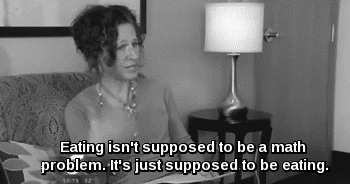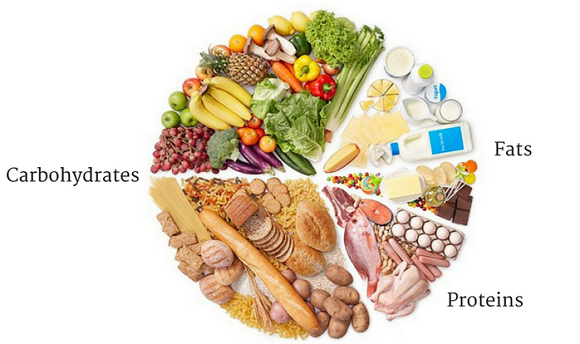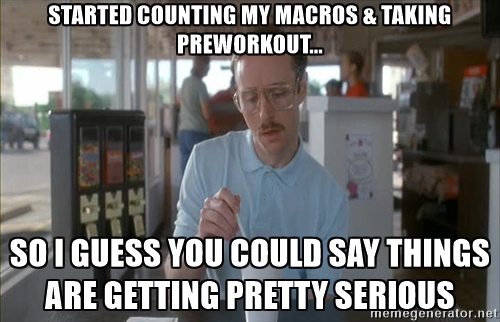If you’re a fitness fanatic or have desperately looked for an effective way to lose weight, you may have resorted to calorie counting. The concept of “calories in vs. calories out” has been around for many years, but exploded in popularity with the rise of low-carb diets. The main idea is that in order to lose weight, you have to take in less than you are taking out.
But let’s face it — tracking your calories is way easier said than done. When we’re deep in papers, assignments, presentations, and just generally trying to keep our mental health sane during finals week, it’s not worth worrying about the fact that we’ve gone a little above the recommended daily intake. If your cravings hit, enjoy your carb-heavy pasta dinner because your brain will thank you.

Gif courtesy of giphy.com
Calorie counting can be beneficial if you want a very basic outlook on your overall diet, but it only really works if you have the self-discipline and a good understanding of your metabolism. Otherwise, it’s extremely easy for it to alleviate into an unhealthy habit, leaving us guilty and frustrated for lacking self-control and as a result, drives us into a negative relationship with our food.

Gif courtesy of giphy.com
What are macronutrients?

Photo courtesy of fitnessvsweightloss.com
Macronutrients refer to the energy-providing chemicals that need to be consumed in large quantities (hence the term macro). Carbohydrates, Proteins, and Fats, are the three main players that help to sustain our growth and metabolic functioning. It’s key to understand their role in our bodies and that they’re processed differently from one another. Once you’ve got a hold of this, then you can start to look into the amount of macro’s required for your daily needs. Here’s the breakdown:
Carbohydrates
Carbs are your body’s main energy source. They are easily metabolized and turned into fuel in the form of glycogen. All of your critical organs, like the heart, muscles, kidneys, and the brain (especially the brain) uses the energy from carbohydrates to properly function.
They are divided into two categories: simple and complex. Simple carbs allow for a quick energy source since the body doesn’t require to work as much to break them down. The only downside to the way they digest is that they don’t keep you full for very long, whereas complex carbs do. Common examples of simple carbs are table sugar and fruit drinks, while complex carbs consist of whole grain breads and starchy vegetables.
Proteins
They are essential for the maintenance of all the organs. When your body absorbs them, they get broken down into amino acids which help with growth and repair, (for the fitness junkies I don’t think I need to stress their importance for muscle gains). These amino acids are constantly working in your body to keep your cells and tissues functioning, and when your carbohydrate stores are depleted, they can act as a good source of energy.
Fats
Despite the bad rep they’ve received in the media, are just as critical for our survival. They help with immune function, absorption of vitamins, and maintaining the structures of our cells. Fats, when broken down in the body are stored as triglycerides, and these guys are super rich in energy. Their structure allows them to pack on more fuel than carbohydrates, so over a prolonged period of time, fats become a preferred energy source.
Why would you want to count them?

Photo courtesy of ru.memegenerator.net
Our bodies are complex organisms, and macros are a much better measure of our diet and health. One of the most important things to remember is how your body stores and uses them. If you take in more carbs and proteins than you need, they get stored into fat. Too little macros may result in deficiencies. Of course, because there are simple and complex types which digest differently, this means that the quality of your macros matter as well. Below are some reasons for why counting macros would be useful.
You work out and want results.

Gif courtesy of giphy.com
Some fitness experts believe there is an optimal carb/protein/fat ratio, but all of this depends on your workout and your fitness goal. If your workout consists of steady-state cardio (running, cycling, rowing at a moderate-high intensity) then your meals should be heavy in complex carbohydrates. However, a moderate amount of protein before your workout is essential to help prevent muscle loss during exercise.

Gif courtesy of giphy.com
If your workout consists of weight-training, then you may want to look into adding in a bit more fat and protein, and a little less carbs than you would for cardio. Heavy lifting puts a high demand on your muscle tissue which necessitates more protein for growth and repair. If you’re performing short bursts of high-intensity exercises (whether that’s for weight-lifting or sprints), carbs are the best source of readily available energy, but as soon as the exercise is finished, your body will need more energy as it burns the calories way faster. This is known as the “afterburn effect“, when your body is trying to restore the oxygen levels and muscle tissue.
You’re confused with your body’s hunger signals.

Gif courtesy of giphy.com
Do you crash out mid-afternoon, get midnight cravings, or find yourself extremely hungry shortly after breakfast? There are many reasons for this, but one of them could be that your diet is out of balance. This study points out that higher-carb intake leads to increased alertness better than a high-fat consumption. Your brain is extremely hungry for glucose (the energy source from carbs) so this would make sense. However, keep in mind that it’s important to consume those that are complex and high in fiber as they help regulate your appetite and blood sugar levels. At the same time, the right kind of fats also have their benefits in increasing fullness, weight management, and brain development.
Counting macros will also count your calories.

Gif courtesy of giphy.com
Each macronutrient has a caloric value. Carbs and proteins have 4 kcals/g and fats have 9 kcals/g. Say for example you’re looking at the nutrition label of a cereal box. If it says that it has 10g of fat, you multiply this by 9 and it means that 90 calories are coming from fat. The same goes for carbs and proteins, just multiplied by 4, and if you add all the values together you should end up with a number that’s equal to or almost the same as the total calories stated. It’s like killing two birds with one stone.

Gif courtesy of giphy.com
So that might have been a lot to take in, and while there are many healthy benefits to tracking your macros, it can also be just as obsessive as counting your calories. I’m a firm believer in practicing mindful eating and not depriving your body of what it wants. If you really want something (chocolate, a 4-cheese pizza slice) then it’s better to just indulge in it because when you try to find something to substitute it you may find yourself bingeing on it later. Listen to your body, nourish it with what it needs, and enjoy the sweet pleasures.


